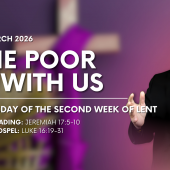God’s ways are mysterious!

July 02, 2025 Wednesday of the Thirteenth Week in Ordinary Time
Daily Readings: Genesis 21:5, 8-20; Matthew 8:28-34
A proverb says, “Man proposes, God disposes.” At Sarah’s suggestion, Abraham begets Ishmael through Hagar, the Egyptian slave. Ironically, it is the same Sarah who later demands that Hagar and her son be sent away. She cannot tolerate the sight of Ishmael and Isaac playing together. God sides with Sarah. Though pained, Abraham obeys God’s will.
When the provisions Abraham gave them run out, Hagar, in despair, abandoned her child to die in the wilderness. But God hears the cry of the boy and intervenes through His angel. He not only opens Hagar’s eyes to a well of water but also reveals a prosperous future for Ishmael. The text tells us that God was with the boy, and he grew up. Thus, through Isaac and Ishmael, God raises two great nations. Hagar and her son become integral to Salvation History.
This episode proves that God never abandons His people. Just as He heard the blood of Abel crying out for justice (cf. Genesis 4:10), He hears the cry of Ishmael. This same God will later hear the cry of the Israelites in Egypt (cf. Exodus 3:6–10). As God’s children, we too have the privilege of crying out to Him amid life’s challenges.
In the country of the Gadarenes, two demoniacs cry out to Jesus for help. God, in the person of Jesus, comes seeking the lost and suffering. Long before His disciples recognize Him as the Son of God, the demons did. The men are freed from demonic possession, but not accepted by the people. The Gadarenes reject Jesus and His divine intervention, valuing the welfare of animals above human life. Their very orientation toward life is called into question.
Call to Action:
In moments of despair or rejection, cry out to God with faith—He hears, He sees, and He saves. Choose to value what truly matters: God's presence and the dignity of every human life.
Radio Veritas Asia (RVA), a media platform of the Catholic Church, aims to share Christ. RVA started in 1969 as a continental Catholic radio station to serve Asian countries in their respective local language, thus earning the tag “the Voice of Asian Christianity.” Responding to the emerging context, RVA embraced media platforms to connect with the global Asian audience via its 21 language websites and various social media platforms.














